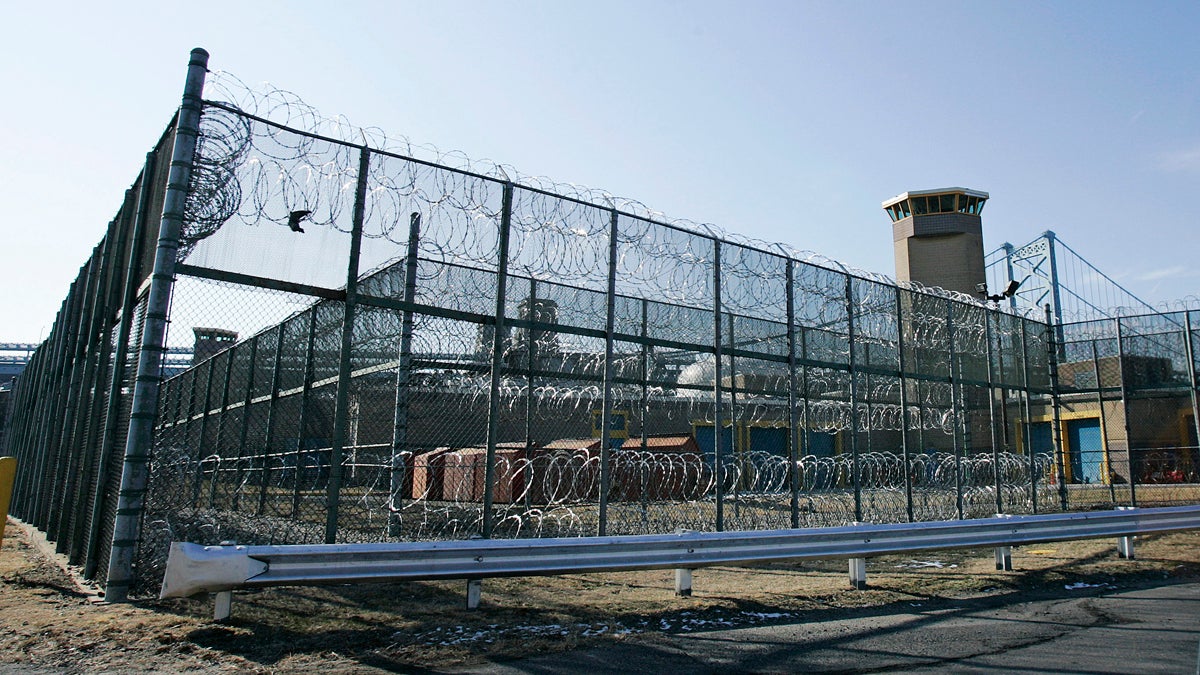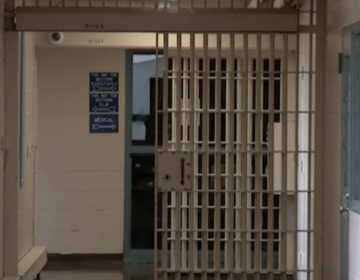New Jersey’s recidivism rate plummets 19 percent over past six years
New Jersey’s rate of prison recidivism has dropped by 19 percent over six years, with fewer than three in 10 of those released winding up reincarcerated within three years.

A guard tower and razor wire at New Jersey Department of Corrections Riverfront State Prison are seen in Camden, N.J. (Mel Evans/AP Photo, file)
This article originally appeared on NJ Spotlight.
—
New Jersey’s rate of prison recidivism has dropped by 19 percent over six years, with fewer than three in 10 of those released winding up reincarcerated within three years, a new report has found.
In this recent study, the National Reentry Resource Center and the Council of State Governments Justice Center study looked at New Jersey and 10 other states with significant declines in their three-year return-to-prison rates. New Jersey’s rate dropped from a high of 37 percent in 2007 to 29.8 percent in 2013, according to the most current data available.
Among factors driving the drop: more residential and community-based programs to help parolees stay on track and make the transition back to life outside prison.
“It’s exciting to see,” said Roseanne Scotti, state director of the New Jersey Drug Policy Alliance.
She cited changes in the state parole system as one reason for the drop in recidivism. The state has increased its offerings of residential and community-based programs for parolees to help them stay on track and make the transition back to life outside prison. There are also programs to help those suffering with substance abuse and mental illness, as well as general rehabilitation.
“If you just slam a person back in prison after they got a job and a place to live, you’re losing all the good progress they have made,” Scotti said. “Instead of saying they are going to punish someone, they are looking at what the issues are and giving more support.”
A second chance at life
Giving a person a second chance with support, rather than automatically locking them up again, is just what was recommended by a 2013 study commissioned by the Pew Charitable Trusts. It found that parolees were less likely to be rearrested within three years than offenders who “max out,” or serve their full sentence. It recommended that the state “develop additional strategies that hold offenders accountable for violations without returning them to expensive prison cells.”
Scotti also said the state has increased funding for re-entry services to help people get housing, job training, and other needed assistance.
One of the groups that has been active in working with former offenders is the New Jersey Re-entry Corp. Based in Jersey City, it has eight locations throughout the state. According to its website, NJRC has a recidivism rate of less than 20 percentand has helped close to 2,400 people get jobs. NJRC gets about $4 million from the state to assist some 4,000 clients. It also just got a separate grant from the state Department of Labor and Workforce Development to fund a pre-apprenticeship program called NJBuild.
“We have found that the most effective approach to lowering recidivism rates has been to rehabilitate the entire person through such initiatives as drug addiction treatment, addressing mental health issues, and expanding offender reentry programs,” said Matthew Schuman, a spokesman for the state Department of Corrections. “One-stop centers connect ex-offenders to a comprehensive array of services. Legislative initiatives, such as ‘ban the box,’ assist former offenders in finding employment.”
Probation pilot
The CSG Justice Center report highlighted a New Jersey Administrative Office of the Courts’ program that uses assessment data to reallocate probation resources to focus on people with the highest risks and needs. Peter McAleer, a spokesman for the courts, said it is a pilot program that began in Mercer, Burlington, and Passaic counties and received funding through a grant from Rutgers University.
“More analysis is needed before we can consider expanding the program statewide,” he said.
Scotti said the state’s designation of Mid-State Correctional Facility as a facility for those with drug addiction and the use of medication-assisted therapy to reduce drug cravings, as well as efforts to connect former offenders with effective addiction treatment on release are also helping to reduce recidivism.
“Making a person’s transition from prison or jail to the community safe and successful is a critical public-safety strategy, and these examples give us a window into how that’s been accomplished in a variety of communities across the country,” said Megan Quattlebaum, director of the CSG Justice Center, which released a separate report highlighting model programs.
“Despite the progress we’ve made over the last two decades toward embracing recidivism reduction as a central mission of corrections agencies, some remain skeptical that these numbers can truly drop,” said Harold Clarke, director of Virginia’s Department of Corrections. “This report is further evidence that they not only can decrease, but in many states, they are.”
Federal funds to reduce recidivism
Along with the unique approaches in each state, the report also gives credit to federal investments over the past decade through the Second Chance Act in programs that use research-based approaches to reduce recidivism. These include: tracking data, the use of risk and needs assessments, strengthened supervision, and connecting people to post-release services.
New Jersey’s recidivism rate was eighth lowest of the 11 states studied, but six states had reduced their reincarceration rates by a greater percentage than New Jersey.
Scotti said New Jersey can do more. The alliance is backing S-761, the “Earn Your Way Out Act,” that is moving through the Legislature. This is a “compassionate approach” to helping those who have been model prisoners earn release earlier and get more assistance reintegrating into society, which means they will be less likely to reoffend.
Under the bill, which passed in the last session only to be vetoed by former Gov. Chris Christie, inmates who were not convicted of a violent crime or a sex crime would be released on parole on becoming eligible, provided they had no serious disciplinary infractions within the prior two years and completed all required rehabilitation programs. Corrections officials would also have to draft and implement individualized, comprehensive re-entry plans for each inmate.
The measure, cosponsored by Sens. Sandra Cunningham (D-Hudson) and Teresa Ruiz (D-Essex), has already cleared the full Senate and is awaiting a hearing before the Assembly Appropriations Committee. “New Jersey has one of the highest rates of people who serve their whole sentence and are released without any support,” Scotti said. “To actually get them support for re-integrating would, I think, be another step in New Jersey’s success.”
WHYY is your source for fact-based, in-depth journalism and information. As a nonprofit organization, we rely on financial support from readers like you. Please give today.




